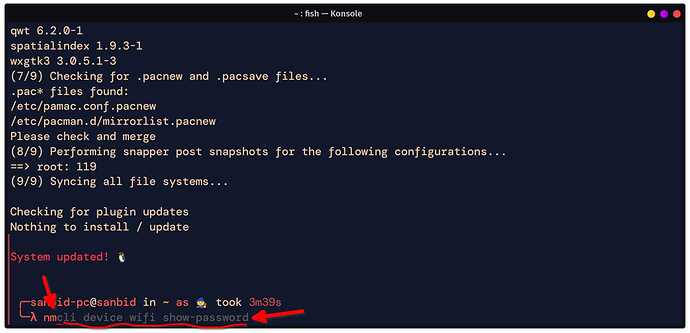I use garuda-update and I am happy to use it.
Is it better
sudo su -
garuda-update
or as user with high privileges (admin)
garuda-update
and insert user password.
my garuda-inxi is
System:
Kernel: 5.18.1-zen1-1-zen arch: x86_64 bits: 64 compiler: gcc v: 12.1.0
parameters: BOOT_IMAGE=/@/boot/vmlinuz-linux-zen
root=UUID=e1b87af6-67e0-4350-97cb-8bdfe430d209 rw rootflags=subvol=@
quiet
cryptdevice=UUID=735c2a29-e901-4fc7-893a-52a88bf43878:luks-735c2a29-e901-4fc7-893a-52a88bf43878
root=/dev/mapper/luks-735c2a29-e901-4fc7-893a-52a88bf43878 splash
rd.udev.log_priority=3 vt.global_cursor_default=0
systemd.unified_cgroup_hierarchy=1
resume=/dev/mapper/luks-23c04b79-4698-461f-ade3-f485919f86ca loglevel=3
Desktop: KDE Plasma v: 5.24.5 tk: Qt v: 5.15.4 info: latte-dock
wm: kwin_wayland vt: 2 dm: SDDM Distro: Garuda Linux base: Arch Linux
Machine:
Type: Laptop System: FUJITSU product: LIFEBOOK A544 v: N/A
serial: <superuser required> Chassis: type: 10 serial: <superuser required>
Mobo: FUJITSU model: FJNBB35 serial: <superuser required>
UEFI: FUJITSU // Phoenix v: Version 1.13 date: 11/18/2013
Battery:
ID-1: BAT0 charge: 0.9 Wh (100.0%) condition: 0.9/4.5 Wh (20.1%)
volts: 12.2 min: 10.8 model: PTL CP651527-01 type: Li-ion serial: <filter>
status: N/A cycles: 274
CPU:
Info: model: Intel Core i7-4702MQ bits: 64 type: MT MCP arch: Haswell
family: 6 model-id: 0x3C (60) stepping: 3 microcode: 0x28
Topology: cpus: 1x cores: 4 tpc: 2 threads: 8 smt: enabled cache:
L1: 256 KiB desc: d-4x32 KiB; i-4x32 KiB L2: 1024 KiB desc: 4x256 KiB
L3: 6 MiB desc: 1x6 MiB
Speed (MHz): avg: 2193 high: 2200 min/max: 800/3200 scaling:
driver: intel_cpufreq governor: performance cores: 1: 2195 2: 2196 3: 2195
4: 2200 5: 2195 6: 2171 7: 2196 8: 2196 bogomips: 35118
Flags: avx avx2 ht lm nx pae sse sse2 sse3 sse4_1 sse4_2 ssse3 vmx
Vulnerabilities:
Type: itlb_multihit status: KVM: VMX disabled
Type: l1tf
mitigation: PTE Inversion; VMX: conditional cache flushes, SMT vulnerable
Type: mds mitigation: Clear CPU buffers; SMT vulnerable
Type: meltdown mitigation: PTI
Type: spec_store_bypass
mitigation: Speculative Store Bypass disabled via prctl
Type: spectre_v1
mitigation: usercopy/swapgs barriers and __user pointer sanitization
Type: spectre_v2 mitigation: Retpolines, IBPB: conditional, IBRS_FW,
STIBP: conditional, RSB filling
Type: srbds mitigation: Microcode
Type: tsx_async_abort status: Not affected
Graphics:
Device-1: Intel 4th Gen Core Processor Integrated Graphics vendor: Fujitsu
driver: i915 v: kernel ports: active: HDMI-A-1 off: eDP-1 empty: VGA-1
bus-ID: 00:02.0 chip-ID: 8086:0416 class-ID: 0300
Device-2: Importek FJ Camera type: USB driver: uvcvideo bus-ID: 1-7:5
chip-ID: 10f1:1a58 class-ID: 0e02
Display: wayland server: X.org v: 1.21.1.3 with: Xwayland v: 22.1.2
compositor: kwin_wayland driver: X: loaded: modesetting
alternate: fbdev,intel,vesa gpu: i915 display-ID: 0
Monitor-1: HDMI-A-1 res: 1920x1080 size: N/A modes: N/A
OpenGL: renderer: Mesa Intel HD Graphics 4600 (HSW GT2)
v: 4.6 Mesa 22.1.0 direct render: Yes
Audio:
Device-1: Intel Xeon E3-1200 v3/4th Gen Core Processor HD Audio
vendor: Fujitsu driver: snd_hda_intel v: kernel bus-ID: 00:03.0
chip-ID: 8086:0c0c class-ID: 0403
Device-2: Intel 8 Series/C220 Series High Definition Audio
vendor: Fujitsu driver: snd_hda_intel v: kernel bus-ID: 00:1b.0
chip-ID: 8086:8c20 class-ID: 0403
Sound Server-1: ALSA v: k5.18.1-zen1-1-zen running: yes
Sound Server-2: PulseAudio v: 16.0 running: no
Sound Server-3: PipeWire v: 0.3.51 running: yes
Network:
Device-1: Intel Wireless 7260 driver: iwlwifi v: kernel pcie: gen: 1
speed: 2.5 GT/s lanes: 1 bus-ID: 03:00.0 chip-ID: 8086:08b1 class-ID: 0280
IF: wlp3s0 state: up mac: <filter>
Device-2: Realtek RTL8111/8168/8411 PCI Express Gigabit Ethernet
vendor: Fujitsu driver: r8169 v: kernel pcie: gen: 1 speed: 2.5 GT/s
lanes: 1 port: 3000 bus-ID: 04:00.0 chip-ID: 10ec:8168 class-ID: 0200
IF: enp4s0 state: up speed: 1000 Mbps duplex: full mac: <filter>
IF-ID-1: virbr0 state: down mac: <filter>
IF-ID-2: virbr1 state: down mac: <filter>
Bluetooth:
Device-1: Intel Bluetooth wireless interface type: USB driver: btusb v: 0.8
bus-ID: 1-8:7 chip-ID: 8087:07dc class-ID: e001
Report: bt-adapter ID: hci0 rfk-id: 5 state: down
bt-service: enabled,running rfk-block: hardware: no software: yes
address: <filter>
Drives:
Local Storage: total: 931.51 GiB used: 106.28 GiB (11.4%)
SMART Message: Unable to run smartctl. Root privileges required.
ID-1: /dev/sda maj-min: 8:0 vendor: Samsung model: SSD 870 QVO 1TB
size: 931.51 GiB block-size: physical: 512 B logical: 512 B speed: 6.0 Gb/s
type: SSD serial: <filter> rev: 1B6Q scheme: GPT
Partition:
ID-1: / raw-size: 922.45 GiB size: 922.45 GiB (100.00%)
used: 106.28 GiB (11.5%) fs: btrfs dev: /dev/dm-0 maj-min: 254:0
mapped: luks-735c2a29-e901-4fc7-893a-52a88bf43878
ID-2: /boot/efi raw-size: 260 MiB size: 256 MiB (98.45%)
used: 682 KiB (0.3%) fs: vfat dev: /dev/sda1 maj-min: 8:1
ID-3: /home raw-size: 922.45 GiB size: 922.45 GiB (100.00%)
used: 106.28 GiB (11.5%) fs: btrfs dev: /dev/dm-0 maj-min: 254:0
mapped: luks-735c2a29-e901-4fc7-893a-52a88bf43878
ID-4: /var/log raw-size: 922.45 GiB size: 922.45 GiB (100.00%)
used: 106.28 GiB (11.5%) fs: btrfs dev: /dev/dm-0 maj-min: 254:0
mapped: luks-735c2a29-e901-4fc7-893a-52a88bf43878
ID-5: /var/tmp raw-size: 922.45 GiB size: 922.45 GiB (100.00%)
used: 106.28 GiB (11.5%) fs: btrfs dev: /dev/dm-0 maj-min: 254:0
mapped: luks-735c2a29-e901-4fc7-893a-52a88bf43878
Swap:
Kernel: swappiness: 133 (default 60) cache-pressure: 100 (default)
ID-1: swap-1 type: zram size: 7.67 GiB used: 1.2 GiB (15.6%)
priority: 100 dev: /dev/zram0
ID-2: swap-2 type: partition size: 8.8 GiB used: 0 KiB (0.0%)
priority: -2 dev: /dev/dm-1 maj-min: 254:1
mapped: luks-23c04b79-4698-461f-ade3-f485919f86ca
Sensors:
System Temperatures: cpu: 70.0 C pch: 62.0 C mobo: 27.8 C
Fan Speeds (RPM): N/A
Info:
Processes: 311 Uptime: 1d 13h 30m wakeups: 13 Memory: 7.67 GiB
used: 2.77 GiB (36.2%) Init: systemd v: 251 tool: systemctl Compilers:
gcc: 12.1.0 clang: 13.0.1 Packages: pacman: 1738 lib: 385 Shell: fish
v: 3.4.1 running-in: konsole inxi: 3.3.16
Garuda (2.6.3-2):
System install date: 2021-03-13
Last full system update: 2022-06-03 ↻
Is partially upgraded: No
Relevant software: NetworkManager
Windows dual boot: No/Undetected
Snapshots: Snapper
Failed units:
